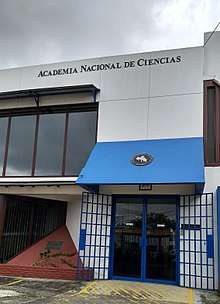Academia Nacional de Ciencias (Costa Rica)
The Academia Nacional de Ciencias (ANC, Spanish for "National Academy of Sciences") is Costa Rica's Academy of Sciences. The ANC was created as a “permanent forum for discussion and scientific analysis,”[1] and serves both as an honorific society as well as a source of scientific advice for the government. It has a mandate to promote scientific culture and progress within Costa Rica, and to foster collaboration between national and international agencies. The ANC maintains membership in international organizations such as the International Council for Science (ICSU), the InterAmerican Network of Academies of Sciences (IANAS) and the Third World Network (TWN).[1] The headquarters of the ANC are in San Pedro, in the province of San José.
 | |
| Established | 1992 |
|---|---|
| President | Pedro León Azofeifa |
| Location | Costa Rica |
| Address | Apto. 1367-2050, San Pedro, Costa Rica |
| Website | www.anc.cr |
Mission
The ANC has several key missions:
1) Promoting the distribution of scientific knowledge within the general public. For example, the ANC holds monthly conferences for Costa Rican professors to present their work to anyone who wishes to attend.
2) Promoting careers in science, for instance by sponsoring fieldtrips for young people to visit places like the Ad Astra Rocket Company and the National Laboratory of Materials and Structural Models at the University of Costa Rica.
3) Maintaining connections with Costa Ricans working abroad – in part this is carried out through “La red TICOTAL,”[2] a program run by the ANC that creates a network of Costa Rican researchers working domestically and internationally in order to promote opportunities for collaboration.
4) Serving as a scientific advisor to the Costa Rican government. When the government has a specific science-related question, the Academy reaches out to members who are experts on the topic and prepares a formal opinion for the government's consideration. Recent topics have included the legalization of in-vitro fertilization [3] and the legalization of cannabis.[4]
History
With the creation of the University of Costa Rica in 1940 and the construction of the first research laboratories in the 1950s, Costa Ricans began the process of carrying out original and independent research within the country. In the 1980s, as the research community was becoming more established, a sense of restlessness was present among researchers to create a central forum for the exchange of ideas and scientific discussions. The creation of the Ministry of Science and Technology in 1986 further fed this restlessness, and in 1990, Law 7169 was passed, "Law for the Promotion of Scientific and Technological Development". In Article 66 of this law, it was established that "with the resources created in this law, the es:Consejo Nacional para Investigaciones Científicas y Tecnológicas (CONICIT) and the Ministry of Science and Technology will both promote the establishment and contribute to the development... of a National Academy of Sciences."[5] The ANC was created with 26 founding members on June 26, 1992, via an executive order. In 1994, the ANC was presented with its official headquarters in San Pedro, a building called the "National House of Science and Technology". The legislative assembly confirmed the existence of the academy in 1995 via "Law 7544, Creation of the National Academy of Sciences".[6]
Members
New members of the ANC are elected by current members, based on their distinguished achievements in original research. This is measured through metrics such as journal publications in prestigious journals and willingness to explore new frontiers of research.[7]
Some distinguished members include Franklin Chang-Diaz, an astronaut who currently is developing plasma rocket propulsion technology for NASA, Sandra Cauffman, Deputy Director of the Earth Sciences Division within the Science Mission Directorate at NASA, Giselle Tamayo, the first female president of CONICIT,[8] and Marino Protti, a seismologist famous for helping predict earthquakes in the Nicoya Peninsula.[9]
Presidents
1992-1994: Dr.hu:Bornemisza Elemér
1995-1998: Dr. Eugenia Flores
1998-2006: Dr. Walter Fernández
2006-2014: Dr. Gabriel Macaya Trejos
2015–present: Dr. Pedro León Azofeifa
References
- "Costa Rica, Academia Nacional de Ciencias". InterAmerican Network of Academies of Sciences (IANAS). Archived from the original on 2017-08-12. Retrieved 2017-07-31.
- "Ticotal". Ticotal. Retrieved 2017-07-31.
- Rodríguez, Irene (2015-05-06). "Academia Nacional de Ciencias pide a Gobierno aprobar FIV" [Academia Nacional de Ciencias requests that the government approves in-vitro fertilization]. La Nación (in Spanish). Retrieved 2017-08-03.
- Arrieta Pérez, Carlos (2015-09-29). "Academia Nacional de Ciencias rechaza legalización del Cannabis en Costa Rica" [National Academy of Sciences rejects legalization of Cannabis in Costa Rica]. Diario Digital Nuestro País (in Spanish). Retrieved 2017-08-03.
- Morera, Pedro. "Sobre la creación de la Academia Nacional de Ciencias, Costa Rica" [The Creation of the National Academy of Sciences, Costa Rica] (PDF). Revista de Biología Tropical (in Spanish). 41 (1): 1–5. Retrieved 2017-07-31.
- LA ASAMBLEA LEGISLATIVA DE LA REPUBLICA DE COSTA RICA (1995-11-15). "Ley de creación". www.anc.cr. Retrieved 2017-08-03.
- Vargas, Monserrath (2015-05-06). "Pedro León, presidente de la Academia Nacional de Ciencias: 'Hay que hacer la ciencia entendible´" [Pedro León, President of the National Academy of Sciences: “We have to make science understandable”]. La Nación (in Spanish). Retrieved 2017-07-31.
- Soto, Michelle (2017-02-10). "Giselle Tamayo: 'Si no logramos que amen la ciencia, nunca va a haber motivación'" [Giselle Tamayo: “If we don´t succeed in helping them to love science, there will never be motivation”]. La Nación (in Spanish). Retrieved 2017-07-31.
- Witze, Alexandra (2013-05-23). "A network to track Caribbean hazards". Nature. 497 (7450): 421–422. Bibcode:2013Natur.497..421W. doi:10.1038/497421a. PMID 23698422.
External links
- Official website (in Spanish)